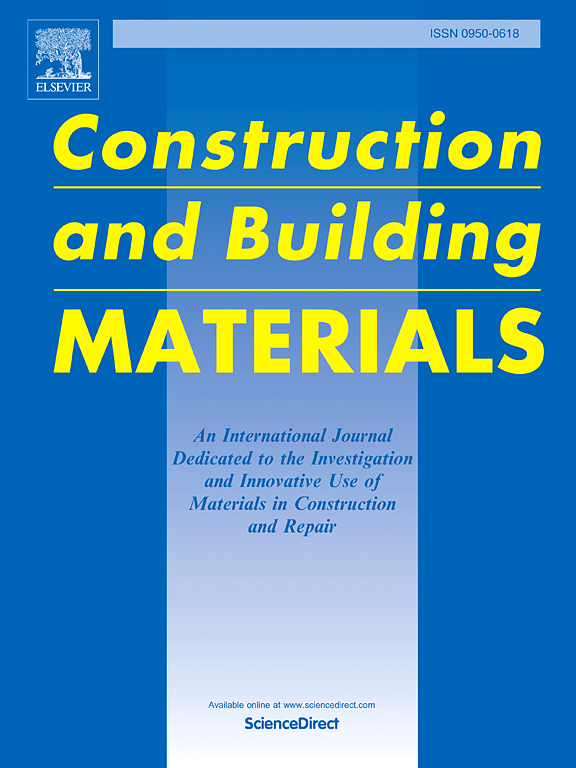Microstructural analysis of bio-based PCM-enhanced lime mortars: Durability and energy efficiency for sustainable buildings
IF 8
1区 工程技术
Q1 CONSTRUCTION & BUILDING TECHNOLOGY
引用次数: 0
Abstract
The development of energy-efficient and sustainable building materials is crucial in reducing energy consumption and environmental impact in the construction sector. This study presents a novel approach by integrating a bio-based microencapsulated phase change material (PCM) into air lime-based mortars, aiming to enhance thermal performance while ensuring durability and mechanical integrity. Unlike conventional PCM-enhanced mortars, this research emphasizes the use of renewable, biodegradable PCMs derived from agricultural sources, reducing reliance on fossil-based alternatives. The optimized formulations were designed to function as rendering mortars, balancing workability, adhesion, and durability for application in both modern and historic buildings. A thorough microstructural investigation through SEM and MIP revealed that controlled PCM dosages (5–10 %) preserved matrix cohesion, whereas higher PCM contents (20 %) led to increased porosity. Thermal performance assessments, including DSC and hotbox experiments, confirmed the effectiveness of the PCM-enhanced mortars in regulating temperature fluctuations and improving energy efficiency. Additionally, durability testing demonstrated the superior resistance of PCM-modified mortars to freeze-thaw cycles and salt crystallization, while cyclability analyses confirmed their long-term thermal stability over multiple phase transitions. These findings establish bio-based PCM-enhanced lime mortars as a resilient, eco-friendly solution for sustainable construction, contributing to climate-responsive design and energy-efficient buildings.
生物基pcm增强石灰砂浆的微观结构分析:可持续建筑的耐久性和能源效率
开发节能和可持续的建筑材料对于减少建筑部门的能源消耗和环境影响至关重要。本研究提出了一种将生物基微胶囊化相变材料(PCM)集成到空气石灰基砂浆中的新方法,旨在提高热性能,同时确保耐久性和机械完整性。与传统的pcm增强型砂浆不同,这项研究强调使用可再生的、可生物降解的来自农业来源的pcm,减少对化石替代品的依赖。优化的配方被设计为渲染砂浆,平衡可加工性、附着力和耐久性,适用于现代和历史建筑。通过SEM和MIP进行的深入微观结构研究表明,控制PCM用量(5-10 %)可以保持基体的内聚性,而PCM含量(20 %)越高,孔隙率越高。热性能评估,包括DSC和热箱实验,证实了pcm增强型砂浆在调节温度波动和提高能效方面的有效性。此外,耐久性测试表明,pcm改性砂浆具有优异的抗冻融循环和盐结晶性,而循环性分析证实了其在多个相变中的长期热稳定性。这些发现确立了生物基pcm增强型石灰砂浆作为可持续建筑的弹性、环保解决方案,有助于气候响应型设计和节能建筑。
本文章由计算机程序翻译,如有差异,请以英文原文为准。
求助全文
约1分钟内获得全文
求助全文
来源期刊

Construction and Building Materials
工程技术-材料科学:综合
CiteScore
13.80
自引率
21.60%
发文量
3632
审稿时长
82 days
期刊介绍:
Construction and Building Materials offers an international platform for sharing innovative and original research and development in the realm of construction and building materials, along with their practical applications in new projects and repair practices. The journal publishes a diverse array of pioneering research and application papers, detailing laboratory investigations and, to a limited extent, numerical analyses or reports on full-scale projects. Multi-part papers are discouraged.
Additionally, Construction and Building Materials features comprehensive case studies and insightful review articles that contribute to new insights in the field. Our focus is on papers related to construction materials, excluding those on structural engineering, geotechnics, and unbound highway layers. Covered materials and technologies encompass cement, concrete reinforcement, bricks and mortars, additives, corrosion technology, ceramics, timber, steel, polymers, glass fibers, recycled materials, bamboo, rammed earth, non-conventional building materials, bituminous materials, and applications in railway materials.
 求助内容:
求助内容: 应助结果提醒方式:
应助结果提醒方式:


